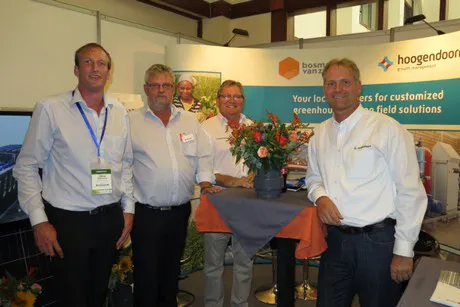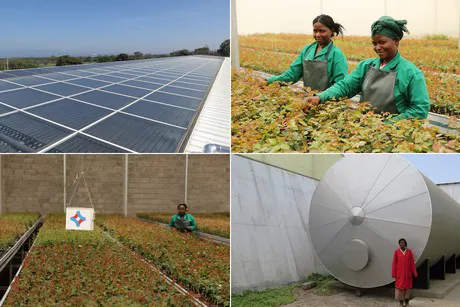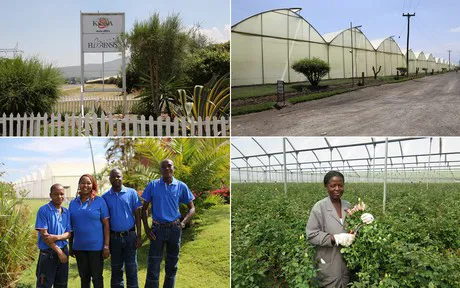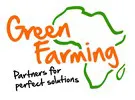
Chris Alphenaar and Dirk Sassen of Bosman van Zaal, Philip Immerzeel of Svensson and Martin Helmich of Hoogendoorn at the IFTEX in Nairobi, Kenya.
Green Farming
For a couple of years now, Green Farming is conducting demonstration projects in Kenya, Ethiopia and Tanzania. With these demonstration projects, 25 Dutch companies in horticulture technology, including Hoogendoorn, try to find tailored solutions to the cultivation challenges of East African growers. This is done in collaboration with the Wageningen University and the Jomo Kenyatta University of Agriculture.
Offering tailored solutions
"It is all about improvements" Says Helmich. So, before setting up a demonstration project, much work has already been done to define the exact problem and to figure out which techniques are needed to offer a tailored solution to a particular situation. All demo projects are based on a existing demand of the market.

Olij Roses. Upper left: Solar panels and collectors at Olij Roses Kenya. Bottom right: Hot water buffertank at Olij Roses.
The drying up of Lake Naivasha, for example: "This is causing problems for the surrounding rose growers", says Helmich. Therefore, to enable growers to deal with this problem, a Demo project, called Water management in East African horticulture, was put into practice at a rose farm in Naivasha. At this farm, Van den Berg Roses, roses were planted on a hydroponic cultivation system, with coco-peat as a growing medium. The project was compared with a soil reference. The use of this technique resulted in four benefits: 65% less water use, less fertilizers, higher turnover and more rose stems, weight and length.
Also the benefits of solar panels and movable screens in East African horticulture are being investigated by Green Farming at the moment. "The current results show that the use of solar energy reduces the energy costs up to 40% and the use of movable screens increases production, decreases occurrence of diseases and enhances the quality of the flowers", says Helmich. For all projects, the payback time is within four years. "The payback time for the water management project is three years and for the solar system at most four years", explains Helmich

VD Berg Roses. Bottom left: the Local service, training and support.
Increasing interest
According to Helmich, there is a growing interest from growers to implement these techniques. "Many African growers are forward thinking and are willing to invest in techniques that will payback itself within a couple of years. For example, the group of South Africans who visited some of our projects a week before the IFTEX. They are eager to learn and invest in order to increase their production volumes, enhance the quality of flowers and reduce their costs in the long-term. At the moment we are discussing the possibilities with a couple of African growers."
Future plans
"The next projects are already in the pipeline" says Chris Alphenaar. As Africa is increasingly more focusing on healthier food, they will start up a new project which will offer growing solutions for the African low-tech greenhouse growers. "We developed special greenhouses that are tailored to the Rwandan and Kenyan altitude and climate. This year, the first vegetables will be produced in these greenhouses."
For more information
Green Farming

T: +31 (0) 317 491540
Email: [email protected]
www.greenfarming.nl
Bosman van Zaal Ethiopia
T: +251 113 724447/48/90
Email: [email protected]

www.bosmanvanzaal.com
Bosman van Zaal Kenya
T: + 254 (0) 707 00 03 08
Email: [email protected]
www.bosmanvanzaal.com
Hoogendoorn Growth Management

T: +31 (0)10 460 80 80
Email: [email protected]
www.hoogendoorn.nl
